Recognizing and Responding to Common Dental Emergencies: Actionable Steps to Take
WebFX reports that unplanned dental care results in over $45 billion in productivity loss for the U.S. workforce.
These losses are often due to dental emergencies. Workers are forced to miss work to seek treatment and recover. These dental issues usually cause individuals significant physical pain and psychological turmoil.
They do not know what actions to take to manage the pain. Some also do not know where to go for emergency dentistry. So, they take a long time searching for nearby dental clinics.
Read on as this blog explores common dental emergencies, how to recognize them, and how to respond effectively when they arise.
Toothache
A toothache can be a sign of problems like cavitiesor gum infections, so it is important to identify the cause early.
If your toothache is sharp and keeps returning, it might be an infection or decay. In this case, urgent dental care is needed.
For temporary relief from tooth pain, consider the following steps:
- Swish warm, salty water in your mouth for rinsing purposes
- Apply cold therapy or a cold compress
- Avoid putting aspirin directly on the tooth, as it may irritate your gums
- Contact a dentist immediately if the pain persists
Ignoring it can lead to worse issues. Knowing the immediate dental treatment signs can help you respond quickly to prevent further damage.
Teeth Sensitivity
Many people downplay tooth sensitivity, thinking it is a minor issue. They do not realize it could be one of the urgent dental care symptoms. Occasional sensitivity to hot or cold is normal.
However, if the sensitivity lasts days or worsens, it may signal a problem. The cause could be worn enamel, gum recession, cavities, or an abscess. If you experience severe sensitivity, visit your dentist right away.
In the meantime, avoid hot or cold foods. Use toothpaste made for sensitive teeth.
Your dentist will identify the cause and suggest the proper treatment. This could include fillings, fluoride treatments, or other solutions.
Do not ignore ongoing sensitivity. If not treated early, it could lead to severe dental problems.
Chipped or Cracked Tooth
Chipped or cracked teeth can happen at any time, especially during sports or accidents. If this happens, rinse your mouth with warm water to clean the area and stop bleeding.
Then, apply a cold compress. A cold compress prevents potential swelling and pain by constricting blood vessels. This limits the amount of blood that can flow to the injured area, resulting in numbness.
Save any broken pieces and bring them to your dentist. Depending on the damage, the dentist may suggest bonding, crowns, or even extraction.
If the crack exposes the pulp inside the tooth, it can cause severe pain. In this case, a root canal may be needed to save the tooth.
Taking quick dental crisis action can protect your teeth and prevent serious problems. To prevent this dental issue, tooth protection, like wearing a mouthguard during sports or high-risk activities, can help.
Broken Dental Restorations
Dental restorations, like crowns or fillings, can break or fall out from wear or trauma. If this happens, keep the area clean. Use dental cement or temporary adhesive to hold the restoration until you see a dentist.
Avoid eating on that side to prevent more damage. The dentist can often repair or replace the restoration to restore its function and appearance. Taking quick dental crisis action can help prevent further damage and reduce the risk of infection.
Dental Abscess
A dental abscess is an infection at the root of a tooth or gums. It often causes severe pain, swelling, fever, and bad breath. If you notice these symptoms, get dental care right away.
An abscess can spread infection to other body parts, causing serious health problems. While waiting for treatment, rinse your mouth with warm salt water to help reduce discomfort. Over-the-counter pain relievers can also ease the pain.
A dentist will drain the abscess to remove the infection. They will clean the area thoroughly and may prescribe antibiotics to stop the infection from spreading.
Knocked-Out Tooth
If you lose a tooth, take these steps quickly:
- Rinse the tooth gently without scrubbing it
- Try putting the tooth back into its jawbone socket
- If reinsertion is not possible, store the tooth in milk or a tooth preservation kit to keep it moist
- See a dentist immediately, as time is critical for saving the tooth
Delaying care can reduce the chances of saving it. If this happens, do not panic. Follow these steps and get to a dentist as soon as possible for the best outcome.
Loose Tooth
If your tooth is loose but still in place, do not bite or chew on that side. Avoid any pressure on the tooth to prevent it from becoming further dislodged.
You may need to visit a dentist to reposition and stabilize the tooth. In some cases, the dentist can save the tooth with treatment.
Pain and Bleeding After a Tooth Extraction
After a tooth extraction, some pain and bleeding are normal. For severe pain or persistent bleeding, follow these steps:
- Use a clean gauze pad by gently biting it down to stop the bleeding
- Replace the gauze if the bleeding does not stop immediately
- Avoid rinsing your mouth or using straws to prevent dislodging the blood clot
- Manage mild pain with over-the-counter pain relievers
- Contact your dentist immediately if the pain worsens or swelling occurs
Identifying dental emergencies early helps prevent infection or complications. Always follow your dentist's instructions for post-extraction care.
Emergency Dentistry: Quick Care When You Need It Most
Dental emergencies can happen anytime and often involve pain, stress, and confusion. Emergency dentistry is essential for addressing these issues promptly. Whether it is a loose tooth or a dental abscess, taking immediate action is key to saving your tooth and relieving pain.
At Braddock Family Dental, we understand the urgency and distress that dental emergencies can cause. Dealing with pain or injury can leave you feeling uncertain about what to do next. That is why we are here to offer fast, reliable care in Fairfax, VA when you need it most.
When a dental emergency strikes, do not wait. Contact us, and we will provide the treatment and care you need.





